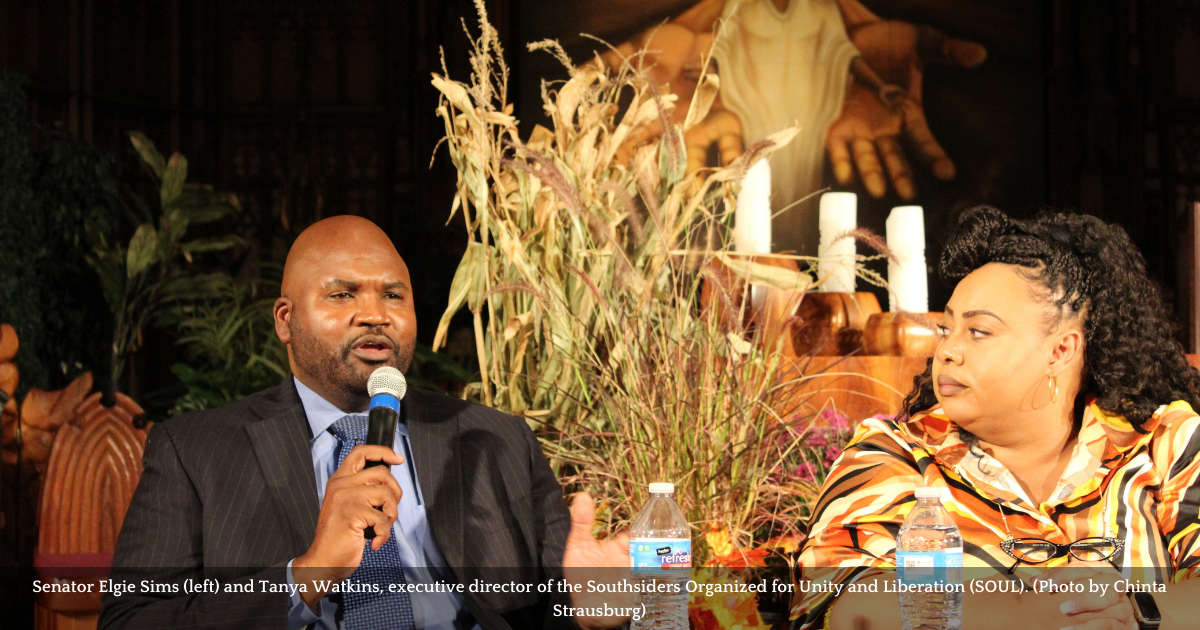Panelists dissected the Safety, Accountability, Fairness and Equity-Today Act (SAFE-T ACT) in a fact vs factoid showdown late Tuesday night, October 18, at the Saint Sabina Church where participants pointed out racism may be fueling a misinformation campaign.
Co-sponsored by Illinois Senator Jacqueline Collins (D-16th) and Saint Sabina, the panelists explained why House Bill 3653, the Criminal Justice Reform bill, is key to increasing public safety for everyone and how it will dismantle the systems they say hold back Black people from achieving their full potential, increase trust between law enforcement and the Black community.
Despite what critics say, the SAFE-T ACT bases detention on risk factors and potential to flee rather than ability to pay. It ensures that judges retain the ability to hold individuals who are a safety risk. The ACT also focuses on the needs of crime victims, and it brings Illinois closer to a system of true safety, fairness and justice.
After January 1, 2023, a person charged with murder, rape, sex offenses or gun crimes, cannot buy their release (bail) no matter how much money they may have.
And a person who has been charged with a minor offense will be released if they do not pose a risk to others whether or not they have access to money.

Joining Collins and Minister Kimberly Lymore, associate minister at Saint Sabina, were panelists Senator Elgie Sims, the lead sponsor of the bill; Tanya Watkins, executive director of the Southsiders Organized for Unity and Liberation (SOUL); Cook County Public Defender Sharone Mitchell; co-sponsor State Representative Justin Slaughter; Mallory Littlejohn, former legal director of the Chicago Alliance Against Sexual Exploitation (CAASE) and Roseanna Ander, founding Executive Director of the University of Chicago Crime Lab.
Sims said the opposition’s misinformation campaign against the ACT is nothing more than a “red herring that is there to distract you from the real issue. The real issue is that over the last five years, not my numbers, $700 million has gone into the cash bail system. Imagine what could happen in the communities” with that kind of money.
“The cash bail system is not about public safety,” Sims said. “It’s about wealth. It is time for us to make sure we have a system about public safety and not about somebody’s access to cash.”
Thanking the Illinois Black Caucus for standing up and defending the Safe-T ACT, Watkins said, “They have all had to carry the all too familiar trauma of what our current system has done to our community.”
Watkins said Black elected officials have had to “contend with the civil unrest in the wake of the murder of George Floyd and countless Black folks at the hands of the state, fielding the cries for help from their constituents who have been brutalized by racialized criminalization.”
In today’s world, Watkins said, “There is a national outcry for comprehensive criminal justice reform that is met with attacks by those who profit off preserving the status quo.”
She was referring to the opponents of the Safe-T ACT who are reportedly spending millions to wage a misinformation campaign in time for the November 8 election. Watkins said this anti-Safe-T ACT movement comes “just after taking the first step toward equity by attempting to end wealth-based incarceration.”
It was in February 2021 that Illinois lawmakers adopted the Safe-T Act. “It was a response to the murder of George Floyd and too many others,” Watkins said. “It highlighted our history of pervasive, systemic racism, mass incarceration and institutional violence and the overwhelming need for policy change.”
The ACT, she said, includes the Pre-Trial Fairness ACT, which after January 2023 “ends the widespread use of wealth-based, pre-trial incarceration that disproportionately impacts Black, brown and low-income people in this state,” Watkins said.
Since the ACT’s passage, she said, “conservatives and law enforcement began spreading misinformation to undermine this historic policy change.
“This tactic is part of a national trend in which opponents of criminal legal system reforms leverage the media to amplify misinformation to scare and confuse the public about reforms that correct harms experienced by people of color and marginalized communities,” Watkins said.
“This targeted misinformation campaign fueled by more than $40 million in conservative money magically hit the doorstep of Black communities just in time for campaign season,” Watkins said. “Yes, I said it.”
Watkins said there are thousands of people who are held pre-trial, who have not been convicted of a crime, like the thousands being detained at the Cook County Jail. Despite what they were accused of, Watkins said, “They did a jail sentence before their day in court.
“There have been folks who spent years in jail pre-trial only to have their cases thrown out once they get to court but not before they’ve been robbed of huge chunks of their lives,” Watkins said.
But, she said, those with money can walk out of jail because they have money to bail out of jail.
“Is this justice?” she asked. “Racists will be pissed off and they will continue to infiltrate our community, but we cannot back down until we purge every single Jim Crow law out of our legislative system.”
Senator Sims, who along with Representative Slaughter, who also co-hosted the ACT, said the community has waited too long for the reform of the criminal legal system that has decimated communities. “It has not made us more safe. It has led to a mass incarceration creating a cycle of recidivism.”
He said there must be a holistic approach to reforming the challenges Blacks face today and that just calling for tougher penalties is not reform.
“You have to prevent people from going into the criminal justice system in the first place because once the crime has happened, it’s too late. In our criminal legal system, we are reactive not pro-active. We don’t address the root causes of the trauma that permeates throughout our communities,” Sims said.
He made it clear that “reform does not equal being anti-police. You can reform the system without attacking law enforcement.”
Sims said they are asking for the same treatment in Black and brown communities that other communities have.
Sims gave an example of how anti-Safe-T ACT opponents are pushing out a sign in the suburbs saying, “Don’t let the Black Caucus write our laws.”
“So, the Black Caucus can stand up for other peoples’ communities, but when it stands up for its own, we are somehow being inappropriate?” Sims called that “patently disrespectful to the communities and individuals I represent.”
Representative Slaughter said, “We are engaged in a mass incarceration crisis destroying communities of color, particularly the Black community.
“Individuals, organizations, coalitions here across this country are doing all they can to benefit from mass incarceration, [and] want to protect the status quo and dangerously mislead the public, misrepresenting the intent and objectives of reforms, putting mass efforts into politicizing what are very real issues in underserved communities.”






